 A B C D E F G H I J K L M N O P Q R S T U V W X Y Z
A B C D E F G H I J K L M N O P Q R S T U V W X Y Z
To help with further browsing click on the large ‘Initial’ to return to the Early Gospel Singers Introduction, or click another initial to take you to details of more early gospel singers.
____________________________________________________________________________________________________________________________
| Name: |
Lil McClintock |
| Location: |
Clinton, South Carolina |
| Born: |
? |
| Died: |
? |
| Biography Synopsis: |
Lil McClintock was an American country blues songster who accompanied himself on acoustic guitar. Not much is known about McClintock’s personal life, before or after he recorded four sides for Columbia Records. Interest in his recordings has been revived over the years, and they are prized by collectors.
McClintock worked as a street performer in Clinton, South Carolina, before he was tasked by manager of Cooper’s Furniture Store, Burm Lessie, with accompanying another local musician, Blind Gussie Nesbitt, to record for Columbia Records. Unbeknownst to Lessie, he first encountered McClintock in 1923 when he wrote a ballad about Delia Holmes, an individual who gained some media attention for being murdered in a casino in Georgia. McClintock was commonly referred to as “Lil”; it has been speculated that this was either an abbreviation of little or a reference to his tall, thin figure.
After traveling by train, McClintock recorded two gospel numbers and two “coon songs” on December 4, 1930. The latter two compositions are in a musical subgenre that is seldom republished, because of its blatantly racist representations of black people. First among the pair was “Don’t Think I’m Santa Claus”, which has a refrain derived from minstrel shows and a rudimentary banjo-inspired accompaniment. Another song, “Furniture Man”, played in a similar style, refers to black people as coons and advertises Cooper’s Furniture Store in the process. In keeping with the minstrel-influenced qualities, McClintock addresses himself as “Mr. Brown” throughout the song. Both McClintock’s and Nesbitt’s recordings were issued in pressings of 750 copies in June 1931; McClintock fared better, as all four of his sides were released.
Following the recording session, McClintock completely disappeared from any documentation. His records have become some of the rarest and sought after items among collectors, with any surviving issues being in pristine condition. In 1986, all of his recordings were issued on the compilation album Atlanta Blues 1927–30: The Complete Recordings in Chronological Order of Julius Daniels and Lil McClintock, which includes McClintock’s material with that of the guitarist Julius Daniels
Source: Wikipedia
See also article on Earlyblues.com : Lil McClintock, Blues and Medicine Shows |
| Recording career: |
1930 |
| Most popular song(s): |
Gospel:
Sow Good Seeds
Mother Called Her Child To Her Dying Bed |
| References / links: |
|
| Images: |
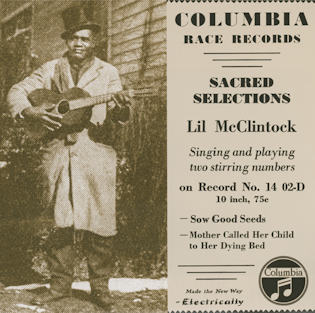 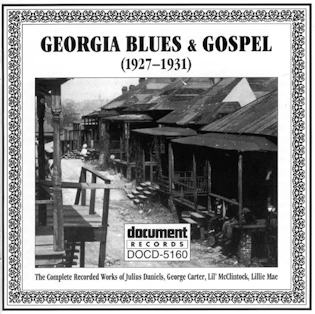 |
| Name: |
Mother McCollum |
| Aka: |
Sister Gertrude Morgan Mother McCollum, also as McCollum’s Sanctified Singers |
| Born: |
Lafayette, Alabama 1900 |
| Died: |
New Orleans, Louisiana 1980 |
| Biography Synopsis: |
Nothin is known about Mother McCollum |
| Recording career: |
1930 – 6 songs |
| Most popular song(s): |
“Jesus Is My Air-O-Plane” |
| References / links: |
|
| Images: |
 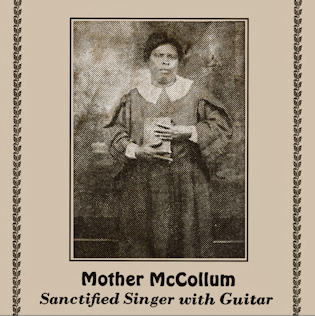 |
| Name: |
Rev. Ford Washington (F. W.) McGee |
| Location: |
Chicago, Il |
| Born: |
1890 |
| Died: |
1971 |
| Biography Synopsis: |
Expertly blending lively congregational singing with powerful preaching, the Reverend F.W. McGee was among the most popular country gospel performers of the pre-Depression era. Born Ford Washington McGee in Winchester, Tennessee on October 5, 1890, he was raised primarily in Hillsboro, Texas; married at the age of 20, within a year and soon after relocating to Oklahoma, he began a career as a teacher. Previously a pastor in a Methodist church, McGee converted to Charles H. Mason’s Memphis-based Church of God in Christ in 1918, in part attracted to their more energetic singing style. By 1920 he had largely abandoned teaching to pursue preaching full-time, and through his revival meetings became a crucial figure in the COGIC’s encroachment into Kansas and Iowa. He later built a congregation in Oklahoma City with the assistance of the noted sanctified singer/pianist Arizona Dranes; by 1925, McGee had also established the first of two tents in the Chicago area.
When Dranes made her first recordings for OKeh in 1926, she recruited McGee and his Jubilee Singers to back her up; in early 1927, he made his headlining debut — albeit mistakenly labeled “Rev. F.N. McGee” — with “Lion of the Tribe of Judah.” He next appeared on Victor a few months later, recording four more titles; among them were “Jonah in the Belly of the Whale” and “With His Stripes We Are Healed,” which coupled together on a 78 reportedly sold over 100,000 copies. Another Victor session followed before the end of year, yielding the hit “Babylon Is Falling Down”; McGee’s popularity as a recording artist also greatly increased the size of his congregation, and by 1928 he had outgrown his tents and built his own Chicago church. His later recording sessions focused primarily on preaching, with musical backing almost incidental; a July 16, 1930 New York City studio date was McGee’s last, although he remained active in the COGIC throughout the decades to follow. He died in 1971.
Source: AllMusic.com by Jason Ankeny
|
| Recording career: |
1927 – 1930 |
| References / links: |
Discography of American Historical Recordings |
| Images: |
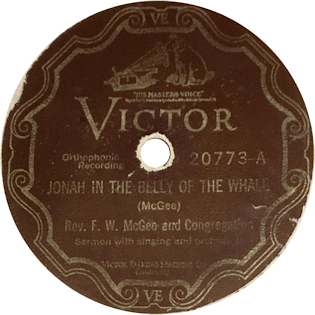 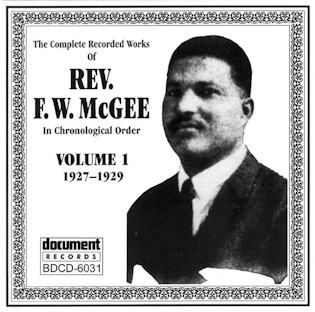 |
| Name: |
Elders McIntorsh and Edwards |
| Location: |
|
| Born: |
|
| Died: |
|
| Biography Synopsis: |
A Memphis gospel group led by two elders in the Church of God in Christ, Elders McIntorsh and Edwards’ Sanctified Singers recorded several sides for Okeh during the late ’20s. Lonnie McIntorsh, one of the leaders, recorded four sides on his own. The group was most renowned for their inclusion on Harry Smith’s 1952 folksong compendium Anthology of American Folk Music. The Document collection Memphis Gospel: Complete Works (1927-1929) includes six sides recorded by Elders McIntorsh and Edwards’ Sanctified Singers, and four by McIntorsh himself.
Source: John Bush, All Music Guide |
| Recording career: |
1927-1929 |
| Most popular song(s): |
|
| Musical Influences: |
|
| References / links: |
|
| Images: |
|
| Name: |
McCoy & Johnson |
| Location: |
|
| Born: |
|
| Died: |
|
| Biography Synopsis: |
|
| Recording career: |
|
| Most popular song(s): |
|
| Musical Influences: |
|
| References / links: |
|
| Images: |
|
| Name: |
Luther Martin Magby |
| Location: |
South Carolina |
| Born: |
5th June 1896 |
| Died: |
10th November 1966 |
| Biography Synopsis: |
Luther Martin Magby was an American gospel singer who recorded two songs for Columbia Records in Atlanta, Georgia on November 11, 1927, in which he both sang and accompanied himself on harmonium and tambourine. He and his wife Mamie were born in South Carolina. At the time of the 1920 Census, they and their one-year-old son Luther C. were living on a farm in Greenville County, South Carolina; Luther’s occupation was recorded as “Farmer, General Farm”. He is recorded as having died in Hartley County, Texas; although his residence at the time is recorded as Dalhart, Texas, which is in Dallam County. In 2002, Luther Magby was performing in gospel shows at state fairs. The surname is uncommon, and that may have been the son, Luther C., already mentioned.
Source: Wikipedia |
| Recording career: |
1927 |
| Most popular song(s): |
Blessed Are the Poor in Spirit
Jesus Is Getting Us Ready for the Great Day |
| References / links: |
|
| Images: |
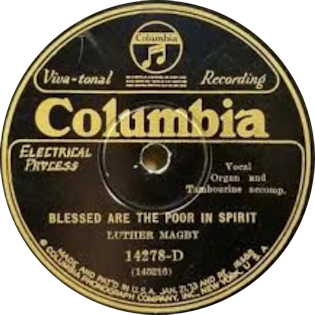 |
| Name: |
Roberta Martin |
| Location: |
Chicago |
| Born: |
1907 |
| Died: |
1969 |
| Biography Synopsis: |
Roberta Evelyn Martin (February 12, 1907 – January 18, 1969) was an American gospel composer, singer, pianist, arranger and choral organizer, helped launch the careers of many other gospel artists through her group, The Roberta Martin Singers.
Born in Helena, Arkansas on February 12, 1907, Martin moved to Chicago with her family in 1917, where she studied piano. Although a high school teacher inspired her to dream of becoming a concert pianist, her future course was changed after accompanying the Young People’s Choir at Ebenezer Baptist Church. She came into contact with Thomas A. Dorsey, known as the Father of Gospel Music, through her work as the pianist for the youth choir. With Dorsey’s help, she and Theodore Frye organized the Martin-Frye Quartet, a youth group consisting of Eugene Smith, Norsalus McKissick, Robert Anderson, James Lawrence, Willie Webb and Romance Watson, in 1933. Martin renamed the group the Roberta Martin Singers in 1936 and added Bessie Folk, Myrtle Scott and Delois Barrett Campbell to the group in the 1940s. The group set the standard for the gospel choir and mixed group, and had an extremely successful recording career, featuring such hits as “Only A Look,” and “Grace.” Most of these songs were published by Roberta Martin Studio of Music, a publishing house in Chicago that she incorporated in 1939, and would eventually publish outstanding compositions by gospel artists ranging from Professor Alex Bradford to James Cleveland. Her first composition, “Try Jesus, He Satisfies,” was an immediate hit in 1943. She was also the choir director of the Pisgah Baptist Church in Chicago for many years.
The theme song of the Roberta Martin Singers is “Only A Look.” It was always sung at the opening of their concerts, at their annual Anniversary Program in Chicago, and was recorded on the Apollo label with Bessie Folk with Delois Barrett as lead soloists and later on the Savoy label with Delois Barrett as lead vocalist. Martin’s group was unique in a number of ways. It was the first to include both male and female voices in a small group format. Martin favored smooth harmonies and a subtle rhythmic dynamic in which her singers were slightly, almost imperceptibly, behind the beat. On slower songs Martin featured lead singers against a subdued background provided by the rest of the group; on jubilee and shout material she used the more energetic call-and-response technique typical of Holiness churches. Martin encouraged her singers to maintain their individual personalities, allowing the audience to distinguish each backup singer’s voice rather than blending them into a single choral sound.
Martin complemented her group’s performance with her piano accompaniment, which often dictated the rhythm and pace of the song or commented on it by responding to or accenting a singer’s performance. Martin’s piano style reflected the influence of Holiness artists such as Arizona Dranes and her classical training. The other musical signature of the Roberta Martin Singers was the accompaniment of “Little” Lucy Smith on the Hammond organ. Her droning introductory chord and unique “passes” using the bass pedals set the tone for a meditative experience and became a recognized trademark of a “Roberta Martin gospel song”.
Roberta Martin died of cancer on January 18, 1969 at the age of 61. Well-known and very popular in the African-American community, her funeral in Chicago attracted over 50,000 mourners.
She composed about seventy songs, arranged and published 280 gospel songs, and reached and inspired thousands of listeners selling sheet music. Her compositions include “He Knows Just How Much We Can Bear,” and “God Is Still on the Throne” (1959), “Let It Be” (1950), and “Just Jesus and Me” (1966). Martin earned six Gold records and the Roberta Martin Singers sang at Gian-Carlo Menotti’s Spoleto Festival of Two Worlds in Spoleto, Italy, in 1963. Her great contribution to the history of gospel music was her development of a distinctive gospel-piano style and the special sound of her group, which integrated for the first time men and women into the gospel chorus during the mid-40s when she brought female voices into her all-male group, which she accompanied on piano. |
| Recording career: |
|
| Most popular song(s): |
|
| Musical Influences: |
|
| References / links: |
|
| Images: |
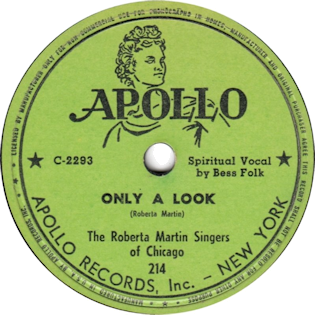 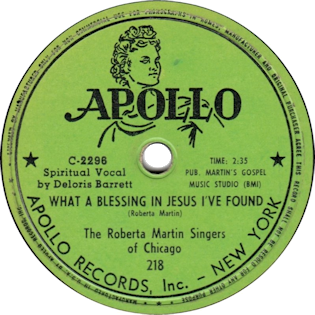 |
| Name: |
Rev. R. M. Massey |
| Location: |
|
| Born: |
|
| Died: |
|
| Biography Synopsis: |
|
| Recording career: |
|
| Most popular song(s): |
|
| Musical Influences: |
|
| References / links: |
|
| Images: |
|
| Name: |
Sister Matthews |
| Location: |
|
| Born: |
|
| Died: |
|
| Biography Synopsis: |
|
| Recording career: |
|
| Most popular song(s): |
|
| Musical Influences: |
|
| References / links: |
|
| Images: |
|
| Name: |
Megginson Female Quartette |
| Location: |
|
| Born: |
|
| Died: |
|
| Biography Synopsis: |
|
| Recording career: |
|
| Most popular song(s): |
|
| Musical Influences: |
|
| References / links: |
|
| Images: |
|
| Name: |
Memphis Sanctified Singers |
| Aka: |
Bessie Johnson & Her Sanctified Singers |
| Location: |
Memphis, TN |
| Biography Synopsis: |
Led by Bessie Johnson and also featuring Melinda Taylor and Sally Sumler, the Memphis Sanctified Singers recorded several sides for Victor during the late ’20s. Though many of their sides were released as Bessie Johnson & Her Sanctified Singers, Harry Smith’s popular 1952 folksong compendium Anthology of American Folk Music listed the group as the Memphis Sanctified Singers. All six sides recorded by the group appear on the Document collection Memphis Gospel: Complete Works (1927-1929). They also appeared on several recordings by the Elders McIntorsh and Edwards’ Sanctified Singers (also featured on the same compilation).
Source: AllMusic |
| Recording career: |
1927 – 1929 |
| Most popular song(s): |
|
| References / links: |
|
| Images: |
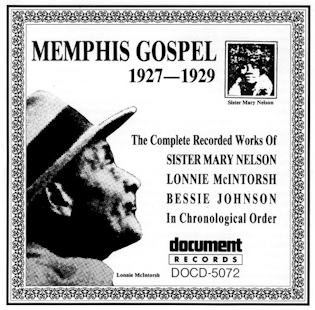 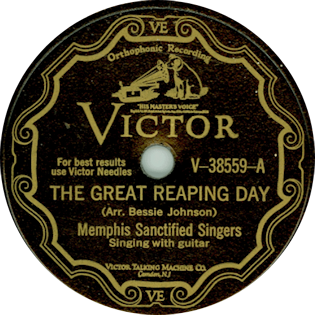
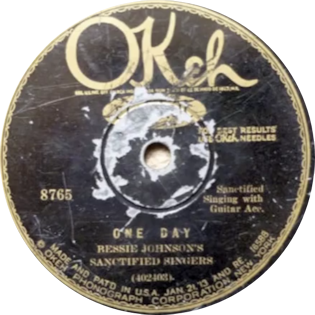
|
| Name: |
Middle Georgia Singing Convention No. 1 |
| Location: |
Georgia |
| Biography Synopsis: |
The Middle Georgia Singing Convention N.1, about whom nothing is known, recorded 6 sides in Atlanta, Georgia in December 1930. Middle Georgia Singing Convention belong to the african-american shape-note singing tradition but the style of the performance is quite distinct from Sacred Harp singing as the voices of the singers harmonize in very rhythmic and syncopated patterns giving the song an almost robotic cadence. |
| Recording career: |
1930 |
| Most popular song(s): |
This Song of Love |
| References / links: |
|
| Images: |
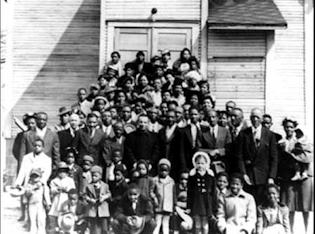 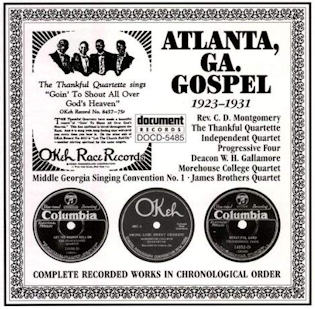 |
| Name: |
Rev. J. M. Milton |
| Location: |
|
| Born: |
|
| Died: |
|
| Biography Synopsis: |
|
| Recording career: |
|
| Most popular song(s): |
|
| Musical Influences: |
|
| References / links: |
|
| Images: |
|
| Name: |
Missouri-Pacific Diamond Jubilee Quartette |
| Location: |
St. Louis, MO |
| Biography Synopsis: |
Members of the quartette thought to be Louis Mills, James Kennedy, William Moore, and Esque Ewing. |
| Recording career: |
1925(?) – 1927 |
| Most popular song(s): |
Four 1927 recorded songs:
Study War No More
Where Shall I Be When The First Trumpet Sounds
Southern Melody
I’ve Been Working On The Railroad
Two unpublished 1925 songs thought to be:
Say Mister: Have You Met Rosie’s Sister?
Melody of Southern Songs |
| References / links: |
|
| Images: |
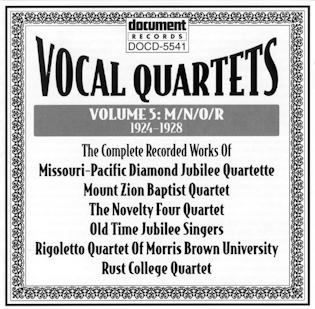 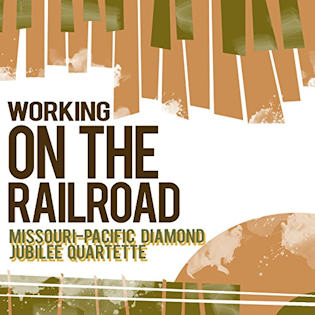 |
| Name: |
Rev. E. S. (Shy) Moore |
| Location: |
|
| Born: |
|
| Died: |
|
| Biography Synopsis: |
|
| Recording career: |
|
| Most popular song(s): |
|
| Musical Influences: |
|
| References / links: |
|
| Images: |
|
| Name: |
Rev. W. M. Mosley |
| Location: |
|
| Born: |
|
| Died: |
|
| Biography Synopsis: |
|
| Recording career: |
|
| Most popular song(s): |
|
| Musical Influences: |
|
| References / links: |
|
| Images: |
|
| Name: |
Mount Vernon Choir |
| Location: |
Mount Vernon , WA |
| Biography Synopsis: |
|
| Recording career: |
1926 – 1931 |
| Most popular song(s): |
Swing Low Sweet Chariot |
| References / links: |
|
| Images: |
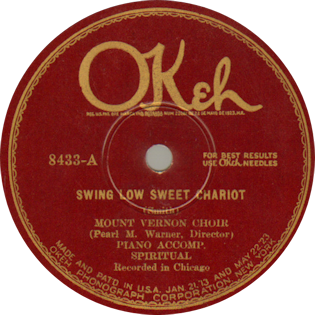 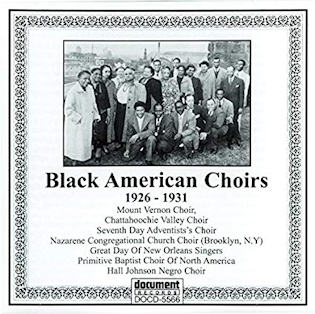 |
____________________________________________________________________________________________________________________________
 A B C D E F G H I J K L M N O P Q R S T U V W X Y Z
A B C D E F G H I J K L M N O P Q R S T U V W X Y Z
To help with further browsing click on the large ‘Initial’ to return to the Early Gospel Singers Introduction, or click another initial to take you to details of more early gospel singers.
____________________________________________________________________________________________________________________________
Please Note:
As this is a continuously developing website, several entries only give the names with no biographical details. Please be patient as these entries are included for completeness, indicating the details are ‘coming soon’ and will be added when time allows.
If there are any early (pre war) gospel singers missing from the lists that you think should be included, please email the details to alan.white@earlygospel.com. Thank you in advance for your assistance.



















